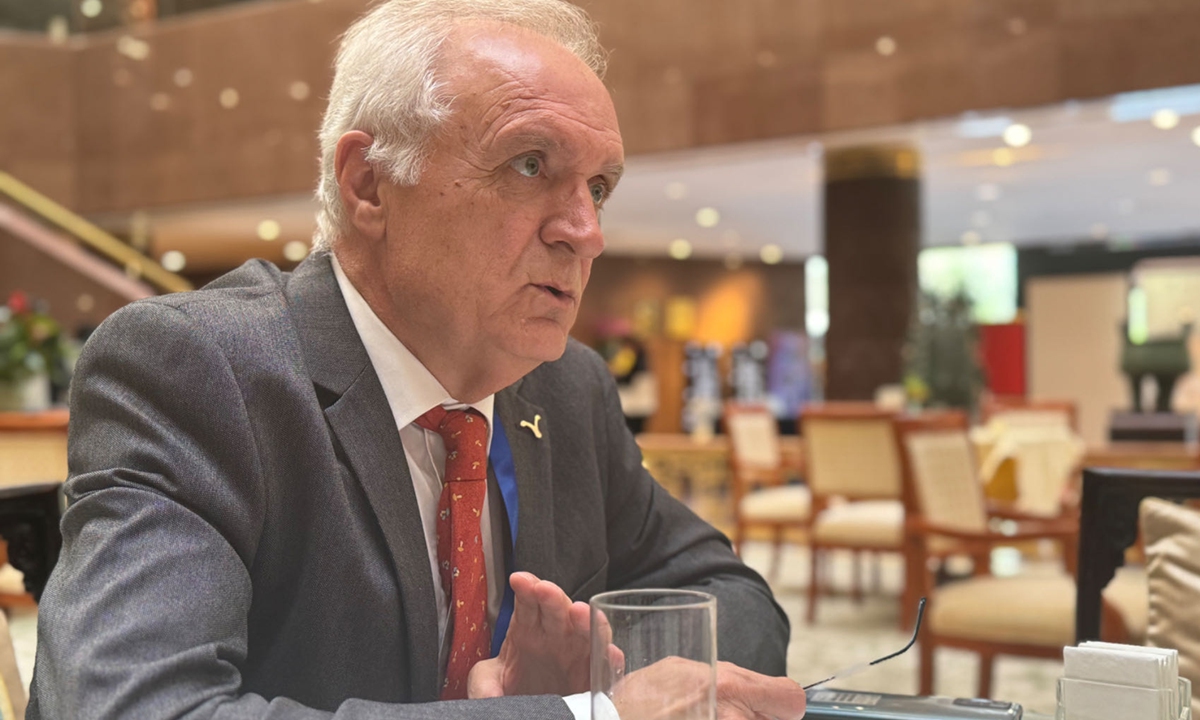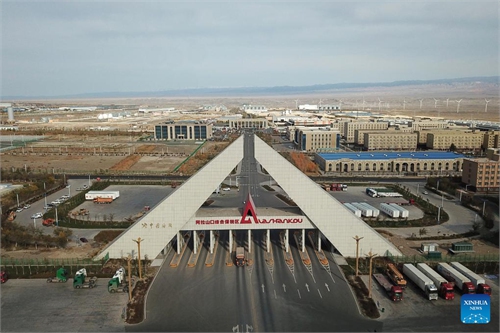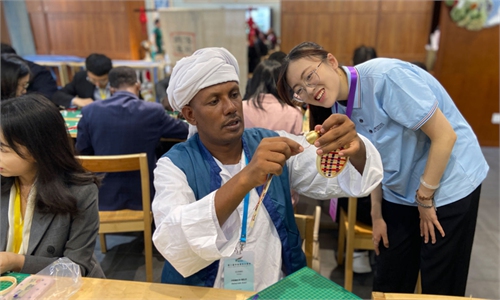IN-DEPTH / IN-DEPTH
History, culture are foundations for understanding China’s politics: renowned Spanish expert

Xulio Rios Photo: Xie Wenting/Global Times
Editor's Note:For a long time, the West has greatly misunderstood China, especially when it comes to China's strategic intentions. They are accustomed to misrepresenting them, wrote Xulio Rios (Rios), a well-known Chinese affairs expert in Spain, in a recent article published on Spanish newspaper El Correo. He also wrote that China has successfully promoted its modernization process and created its own unique path, but China never intends to impose its model on third parties.
Rios is the director of the Observatory of Chinese Politics, and has written several works on China and translated The Art of War by Sun Tzu. He was once awarded by a subsidiary of the Spanish Ministry of Foreign Affairs for his efforts to "introduce the real China."
Recently, during an interview with Global Times reporters Xie Wenting and Bai Yunyi (GT) in Beijing, he noted that the modernization trajectories of China and the West are different. China's path to modernization has allowed it to retain true sovereignty, making decisions based on its own interests and setting the pace. "This is a completely different experience and produces different results," he said.
GT: You have translated the classic Chinese military work The Art of War by Sun Tzu, which has always been regarded as a gem in China's ancient military cultural heritage. Concepts such as "valuing martial arts without resorting to violence," and "working together in the same boat" still hold great significance and practical value today. What impact did the process of translating this book have on you? How do you view the influence of The Art of War and other ancient Chinese philosophical thoughts on today's Chinese political and diplomatic style?
Rios: With the help and collaboration of professional colleagues, I translated a version of The Art of War. This is a classic work that holds a very important position in Chinese culture. In the West, Sun Tzu is regarded as a great general and military theorist like Carl von Clausewitz, and the study of his military concepts and thoughts is part of every military academy curriculum.
However, I believe that The Art of War is not just a military work; it embodies many ancient Chinese classic philosophical ideas. It covers various fields, from political strategy to trade, and can provide valuable insights into all of them. I have about 30 to 40 versions of The Art of War at home, and I think that if one wants to understand China, it is necessary to delve into this book because it still influences China's political and strategic decision-making today.
For example, there is a famous line in The Art of War: "The supreme art of war is to subdue the enemy without fighting." "Avoiding war" is still a fundamental part of China's foreign policy today, as China has always sought to avoid conflict and find consensus whenever possible. We can see that China always seeks to share rather than confront. In this sense, I believe that The Art of War is the "source of inspiration" for many of China's policies.
Furthermore, I believe that studying the history of China's Warring States period (475BC-221BC) also helps us understand the logic behind some of China's actions today, as we are also living in an era of power shifts and changes. In the West, historical classic works may appear in textbooks, but their influence on the current behavior of these countries is not as prominent. However, China is different; its leadership has always attached great importance to history and draws experience from it to solve problems. History and culture are the foundations for understanding China's current politics.
GT: This year marks the 75th anniversary of the founding of the People's Republic of China. You have been studying China for over 30 years and have visited many places in China. What new feelings do you have about China during your current visit? What new changes have you noticed in China?
Rios: China has been constantly changing. I can feel the changes in China every moment, for example, in the field of technology, the development of speedy mobile internet is much faster than any Western country, leaving a deep impression on every foreign visitor.
This is almost the opposite of the feeling I get when I visit cities in Western countries - time seems to stand still there, while in China, everything is changing and developing. I believe that China is a representative of modernization and progress, and is a place worth learning from for the outside world.
GT: You recently published an article in the Spanish newspaper El Correo titled "Chinese path to modernization." How do you view the concept of the "Chinese path to modernization?" Some scholars believe that China has entered a new stage in the process of modernization, while others in the West claim that China's reform and opening-up process has come to an end. What is your opinion on these viewpoints? What are the new characteristics of China's current political and economic development?
Ríos: The reform and opening-up process in China has not ended, and it has just entered a new stage. I believe that China's leadership has a clear action plan, including setting two goals for 2035 and 2049. This means that China needs a series of major transformations.
In addition, China needs to face a tense and complex international situation, as its modernization process has raised doubts and concerns in some countries about China's intentions. It is worth noting that the new stage is not disconnected from China's previous history, and it is just that today's China is facing new industrial, technological, and international realities, and therefore needs a series of new actions to respond to these realities and establish new "dynamics."
For example, China is increasingly participating in international affairs in its own way, which is a result of China's increased capabilities today and is one of the most significant features of Chinese politics. Whether it is the Belt and Road Initiative (BRI), the BRICS+ mechanism, or international institutions like the Asian Infrastructure Investment Bank, they all clearly demonstrate China's commitment to multilateralism and openness to multilateral affairs.
It is clear that China needs to play a more important role on the world stage, as this is a reflection of the changing global economic power in other areas, which is in line with both China's interests and global interests.
Furthermore, I have observed that China's emphasis on ideology is increasing today, with a certain "revival" of Marxism and traditional Chinese culture. China is trying to "integrate" these ideas, rather than viewing different ideologies as contradictory and irreconcilable as in the West. I believe this is China's way of strengthening ideological sovereignty and avoiding the destabilization of China's political direction by Western liberal ideas.
GT: How do you evaluate the current research by Western scholars on the Chinese path to modernization?
Rios: I think the topic of the Chinese path to modernization has not been well-researched in the West. I strongly believe that China should have its own development path to achieve modernization. The introduction of this concept has tremendous historical significance.
The modernization process in the West happened earlier than in China. Some Western scholars also believed that "history has ended" after the collapse of the Soviet Union. However, now China is advancing modernization through a different approach. Whether it is in terms of economic or social models, Chinese modernization is significantly different from the Western model. China is using its own way to find answers to some of the problems.
GT: In your opinion, what are the differences between Chinese modernization and Western modernization?
Rios: This is a complex comparison. In my view, the trajectory of modernization in China and the West has significant differences. The modernization of developed Western countries is largely built on the conquest and exploitation of other countries, while China's modernization is built on its own social and economic development.
There are also important differences in development models. China's economic model combines both market and planning elements. However, in many Western countries, we do not see this kind of integration. I believe that this both market-oriented and government-planned economic model has achieved positive results and remains effective.
One of the most important characteristics of the Chinese path to modernization is that it preserves true sovereignty. China makes decisions based on its own interests, and sets its own pace and model, rather than accepting externally imposed decisions. This is a completely different experience and produces different results.
GT: You have said in previous interviews that China has achieved its goals through its own development path and approach, and that many of China's experiences will undoubtedly be worth learning from. In which areas do you think China's experiences are worth learning from for other countries?
Rios: One of the most important lessons from the Chinese path to modernization for other countries is to think for themselves, make their own judgments on issues, and determine policies based on their overall interests rather than external evaluations or waiting for external guidance. I think this is a key point.
Besides, I believe it is necessary for many countries to deeply analyze China's policies in various aspects, which may be applicable to some countries and not to others. I have noticed that some developing countries have established economic zones like China, some of which have been successful and some not so successful, due to differences in education levels, labor force, and capabilities in the public and private sectors.
However, undoubtedly, China's model can serve as a reference for many countries, which can then adjust according to their own circumstances.
Just as China has said, it cannot copy the models of other countries, nor does it want to impose its own model on other countries. Copying is not a good solution, but Chinese experiences such as strengthening the capacity of the public sector and re-examining collectivist values can serve as reference points for other countries.
GT: In your opinion, what has been the biggest misunderstanding about China by the West in recent years?
Rios: I think the biggest misunderstanding about China by the West in recent years is about China's strategic intentions. Some Westerners believe that China wants to revive its past glory, weaken the West, and put the West in a difficult situation.
Therefore, there is a great deal of disagreement about China's rise, with some believing that they must protect themselves from the threat of a powerful China. But for another part of the Western population, China represents an opportunity. They want to engage in dialogue and understand China's policies.
We cannot expect China, with highly developed productivity and technology, to exist in Asia in isolation. As its strength grows, it is logical for China's position on the global stage to rise. However, it will take more time for (Western countries) to adapt to this process and adjust their responses accordingly. But one thing is very clear: We cannot push China aside to manage this world.


